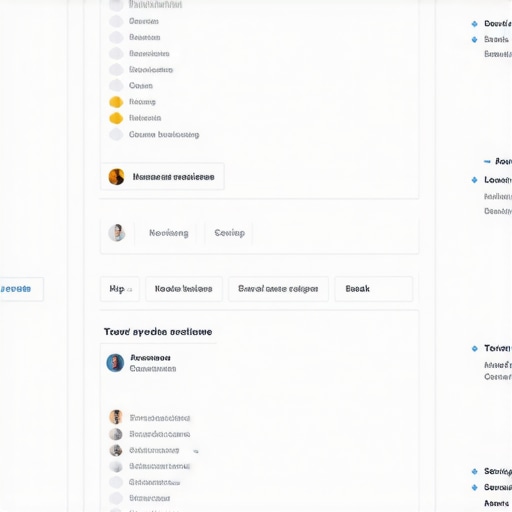Harnessing Customer Feedback for Strategic Local SEO Enhancement
In the fiercely competitive landscape of local search, customer reviews have transcended their traditional role as mere testimonials. They now serve as vital data points that influence search engine algorithms, shape reputation, and drive consumer decision-making. As an expert in local SEO, understanding how to leverage reviews effectively can be the difference between obscurity and prominence in local search results.
Understanding the Nuanced Impact of Customer Reviews on Local SEO
Recent studies, including insights from Moz’s Local Search Ranking Factors, reveal that reviews significantly impact local pack rankings and Google Maps visibility. Not only do they contribute to keyword relevance, but they also signal trustworthiness and engagement to search engines. High-quality, keyword-rich reviews can enhance a business’s semantic footprint, reinforcing its topical authority within a geographic niche.
Advanced Strategies for Integrating Customer Reviews into Your Local SEO Framework
What Are the Most Effective Tactics for Extracting Maximum SEO Value from Customer Reviews?
To unlock the full potential of reviews, implement a systematic approach: encourage detailed, authentic feedback that naturally incorporates relevant keywords; respond promptly to reviews to demonstrate active engagement; and embed reviews strategically on your website to improve on-page SEO. Additionally, optimize Google My Business (GMB) reviews by requesting reviews that highlight specific services or features, thereby enriching your local content ecosystem.
Optimizing Review Signals for Google’s Local Algorithm
Beyond volume, the quality and recency of reviews are crucial. Regularly monitor review sentiment and address negative feedback professionally, turning detractors into advocates. Use schema markup to highlight reviews on your website, which can enhance rich snippets and click-through rates. Furthermore, leverage review management tools such as BrightLocal to analyze review performance and identify content gaps.
Aligning Review Acquisition with Hyperlocal SEO Tactics
Reviews should be part of a broader hyperlocal SEO strategy that includes localized citation building, hyperlocal content creation, and neighborhood targeting. By cultivating reviews that mention specific landmarks, neighborhoods, or local events, you create a semantic network that reinforces your business’s local relevance. This approach ensures your reviews serve as both social proof and SEO signals.
Addressing the Complexities of Review Authenticity and Manipulation
While reviews are powerful, their influence hinges on authenticity. Search engines employ sophisticated detection algorithms to identify fake or incentivized reviews, which can harm rankings. Maintaining transparent review solicitation practices and complying with platform policies ensures long-term trust and authority.
How Can Businesses Balance Review Quantity and Quality to Maximize SEO Impact?
Striking this balance requires a strategic review acquisition plan that emphasizes authentic, detailed feedback over mere quantity. Prioritize reviews that provide specific insights into your offerings, as these carry more weight in local SEO. Regularly analyze review sentiment and adjust your engagement tactics accordingly.
Explore more advanced local SEO techniques, such as optimizing your GMB profile and citation strategy, by visiting this comprehensive guide. For ongoing insights and industry updates, consider contributing your expertise or consulting with local SEO specialists to refine your review strategy continually.
Transforming Customer Reviews into a Dynamic Local SEO Asset
In the ever-evolving landscape of local SEO, customer reviews are no longer static testimonials but vibrant signals that influence search rankings and consumer perceptions. As an SEO expert, leveraging reviews effectively requires a nuanced approach—one that integrates review content into your broader local search strategy to foster trust and boost visibility.
Decoding the Hidden Power of Review Content and Sentiment
Research from industry leaders such as Moz highlights that review sentiment and keyword usage within reviews can dramatically sway your local search performance. High-quality reviews containing specific service keywords or local landmarks reinforce your topical relevance, while positive sentiment enhances your reputation signals. Utilizing tools like GMB review strategies can help you systematically gather and analyze review content for maximum SEO benefit.
How Can Advanced Review Optimization Techniques Elevate Your Local SEO?
Beyond simple review collection, deploying advanced techniques such as schema markup for reviews, integrating reviews into your website’s FAQ sections, and creating review-rich local landing pages can significantly enhance your visibility. Embedding reviews with schema markup allows search engines to display rich snippets, increasing your click-through rates and local prominence. Additionally, encouraging reviews that mention specific landmarks or community events creates a semantic network that underscores your local relevance, especially important for hyperlocal SEO efforts like those detailed in hyperlocal SEO strategies.
What Are the Key Considerations for Balancing Review Authenticity and Quantity in 2025?
Authenticity remains paramount in review management, especially as search engines become more sophisticated in detecting fake reviews. While increasing review volume can boost your profile’s credibility, it’s crucial that reviews are genuine and detailed. Authentic reviews provide richer keywords and insights that algorithms favor, but quality always trumps quantity. Implementing a transparent review solicitation process and regularly auditing your reviews with tools like BrightLocal ensures you maintain trustworthiness and adherence to platform policies, which is vital for long-term success.
For a comprehensive approach to local SEO, including review management, citation building, and content optimization, explore the full SEO master guide. Regularly updating your strategies by consulting industry experts can keep your local presence resilient and competitive in 2025 and beyond.
Harnessing Review Content for Hyperlocal SEO Domination
In the realm of local SEO, the strategic use of customer reviews extends beyond simple reputation management; it becomes a sophisticated tool for hyperlocal dominance. By integrating review content into your keyword and content strategy, you craft a semantic network that resonates with both search engines and community context. For instance, reviews mentioning local landmarks, neighborhood names, or community events subtly embed your business into the local fabric, boosting relevance and visibility in geographically targeted searches.
How Can Businesses Leverage Review Data to Develop Hyperlocal Content that Converts?
Transform reviews into a goldmine of insights by analyzing frequently mentioned keywords, sentiment, and local references. Use this data to craft blog posts, FAQs, and landing pages that reflect the language and concerns of your community. For example, if multiple reviews highlight your proximity to a well-known park, develop content around that landmark, incorporating keywords that reinforce your local relevance. This approach not only enhances SEO but also fosters a sense of community trust and authority.

Employing Schema Markup to Amplify Review Impact and Rich Snippets
Implementing schema markup for reviews is a technical yet powerful method to enhance your search listings. By marking up reviews with Review schema, you enable search engines to display rich snippets, which can include star ratings, reviewer names, and review summaries. These visual cues significantly increase your click-through rates and provide social proof directly in search results, elevating your local prominence and credibility.
What Are the Best Practices for Implementing Review Schema to Ensure Compliance and Maximize Visibility?
To maximize benefits, ensure your schema markup is accurate, up-to-date, and complies with Google’s guidelines. Use JSON-LD format for implementation, and verify your markup with tools like Google’s Rich Results Test. Avoid fake or incentivized reviews, as schema markup is subject to strict policies that penalize manipulative practices. Consistent, authentic reviews with appropriate schema markup create a transparent and compelling search presence.
For detailed technical guidance, consult Google’s Structured Data documentation.
Integrating Review Insights into Your Local PPC and Content Strategies
Beyond organic SEO, reviews can inform pay-per-click (PPC) campaigns and localized content marketing. Analyze review sentiment to identify pain points and unique selling propositions, then tailor ad copy and landing pages accordingly. For example, if reviews frequently mention your exceptional customer service, highlight this in your ad messaging and create dedicated landing pages that reinforce this strength.
Moreover, incorporate review snippets into your ad extensions and social media content to build trust and social proof, increasing conversion rates. This integrated approach ensures your reviews influence multiple facets of your local marketing ecosystem, leading to a cohesive and powerful brand narrative.
How Can Advanced Sentiment Analysis and AI-Driven Review Monitoring Improve Your Local SEO Performance?
Deploy AI and machine learning tools to perform real-time sentiment analysis across thousands of reviews. These technologies can identify emerging trends, detect potential issues before they escalate, and suggest targeted engagement strategies. For example, if sentiment analysis reveals growing dissatisfaction about a specific service aspect, you can proactively address it, turning negative reviews into opportunities for reputation enhancement.
Tools like MonkeyLearn or Lexalytics offer sophisticated sentiment analysis capabilities that integrate with review management platforms, enabling data-driven decisions that refine your local SEO tactics continuously.
Interested in mastering these advanced techniques? Dive deeper into the latest tools and strategies by exploring industry-leading resources and collaborating with local SEO specialists to stay ahead in 2025.
Unlocking the Deep Secrets of Review Optimization for Hyperlocal Domination
In the relentless pursuit of local search supremacy, the strategic utilization of customer reviews transcends basic reputation management, evolving into a sophisticated tool that can dramatically enhance your geographic relevance. Delving into the nuanced integration of review content with schema markup, local landmarks, and community references enables savvy businesses to craft an indelible presence in search results. This approach transforms reviews from mere feedback into dynamic SEO assets that resonate with both search engines and local audiences.
How Can You Leverage Review Data to Construct Hyperlocal Content that Converts?
By meticulously analyzing reviews for frequently mentioned local landmarks, neighborhood names, and community events, businesses can generate hyperlocal content that directly addresses residents’ interests and queries. For instance, a restaurant near a popular park can develop blog posts emphasizing its proximity, embedding keywords that reinforce its local relevance. This semantic alignment not only boosts organic visibility but also fosters community trust, turning satisfied customers into brand ambassadors.

Harnessing Schema Markup for Enhanced Rich Snippets and Click-Through Rates
Implementing review schema markup is a technical mastery that significantly amplifies your search appearance. Proper JSON-LD implementation of Review schema enables the display of star ratings, reviewer snippets, and review summaries directly in search listings. These enhancements provide social proof, attract more clicks, and position your business as a trusted local authority. Ensuring compliance with Google’s structured data guidelines is essential to avoid penalties and maximize visibility.
What Are the Best Practices for Implementing Review Schema to Ensure Compliance and Maximize Visibility?
Adopt accurate, up-to-date markup using JSON-LD, verify with Google’s Rich Results Test, and maintain transparency in review solicitation. Avoid incentivized or fake reviews, as violations can lead to ranking penalties, undermining your efforts. Consistent, authentic reviews integrated with schema markup create a transparent, authoritative search presence that resonates with both users and algorithms.
Explore Google’s Structured Data documentation for comprehensive implementation guidance and stay ahead in the evolving landscape of search optimization.
Integrating Review Insights into AI-Driven Sentiment Analysis for Real-Time Optimization
The advent of AI technologies enables continuous, real-time monitoring of review sentiment, providing predictive insights into customer perceptions. Deploying tools like MonkeyLearn or Lexalytics allows businesses to identify emerging issues proactively, tailor engagement strategies, and refine local SEO tactics dynamically. This intelligent feedback loop facilitates an agile response to reputation signals, fostering long-term trust and visibility.
Interested in transforming your review management with AI? Engage with industry-leading platforms and expert consultants to harness these cutting-edge solutions for sustained local SEO dominance.
Expert Insights & Advanced Considerations
1. Leveraging Sentiment Analysis for Precise Optimization
Utilize AI-powered sentiment analysis tools to monitor review tone and emerging trends, enabling proactive reputation management and content adaptation that boosts local relevance and search rankings.
2. Integrating Reviews with Hyperlocal Content Creation
Analyze review keywords to craft hyperlocal content that resonates with community interests, such as landmarks or events, thereby strengthening semantic relevance and local search visibility.
3. Implementing Schema Markup for Enhanced Rich Snippets
Apply structured data using JSON-LD to reviews, increasing the likelihood of featuring star ratings and review snippets directly in search results, which drives higher CTR and local prominence.
4. Balancing Authenticity and Quantity for Long-Term Trust
Develop a transparent review collection strategy that emphasizes detailed, genuine feedback over volume, ensuring sustained trustworthiness and compliance with platform policies.
5. Incorporating Review Data into PPC and Content Marketing
Leverage review insights to refine ad copy and landing pages, highlighting strengths like customer service, and utilize review snippets to enhance ad extensions and social proof.
Curated Expert Resources
- Google’s Structured Data Documentation: Provides comprehensive guidelines for implementing review schema markup effectively and compliantly.
- BrightLocal’s Review Management Platform: Offers tools for monitoring, analyzing, and responding to reviews to optimize local SEO performance.
- Moz’s Local Search Ranking Factors: Shares in-depth insights into how reviews influence local pack rankings and algorithm signals.
- MonkeyLearn AI Tools: Facilitates real-time sentiment analysis across reviews, enabling dynamic reputation management.
- Google My Business SEO Strategies: A well-curated resource for integrating reviews into broader local SEO tactics.
Final Expert Perspective
In 2025, mastering local SEO hinges on sophisticated review strategies that blend sentiment analysis, schema markup, hyperlocal content, and authentic engagement. These approaches not only elevate search rankings but also build enduring community trust and brand authority. Dive deep into these advanced techniques and collaborate with industry experts to stay ahead in competitive local markets. For a comprehensive blueprint, explore this authoritative guide and refine your approach continually to sustain dominance in local search results.




